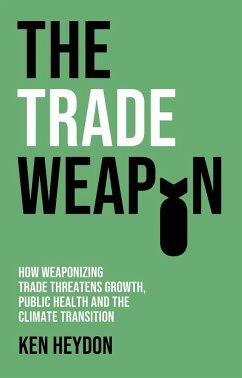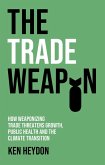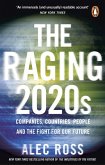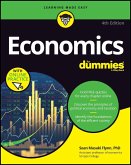Prompted by geostrategic rivalry and the war in Ukraine, COVID-19 and the climate transition, trade policy is increasingly being weaponized. This trend towards protectionist capture and retaliation is self-sabotaging and bad for growth. But there is another way.
In this hard-hitting book, Ken Heydon offers alternatives to the trade weapon: the need for diplomatic carrots to accompany the sanctions stick; for resilience in supply chains rather than self-sufficiency through ill-advised reshoring and friend-shoring; for multilateral WTO remedies to rule breaking rather than unilateral penalties in the name of national sovereignty; and for direct action on environment and public health goals rather than the blunt tool of trade restriction.
But, to restrain the damaging subordination of trade policy to other ends, governments must address the discontents of trade and do better at helping losers, adjusting to technological change and making the case for open markets. Atstake are three decades of income gains from globalization and the ability to deal effectively with the climate transition and the next pandemic.
Hinweis: Dieser Artikel kann nur an eine deutsche Lieferadresse ausgeliefert werden.
In this hard-hitting book, Ken Heydon offers alternatives to the trade weapon: the need for diplomatic carrots to accompany the sanctions stick; for resilience in supply chains rather than self-sufficiency through ill-advised reshoring and friend-shoring; for multilateral WTO remedies to rule breaking rather than unilateral penalties in the name of national sovereignty; and for direct action on environment and public health goals rather than the blunt tool of trade restriction.
But, to restrain the damaging subordination of trade policy to other ends, governments must address the discontents of trade and do better at helping losers, adjusting to technological change and making the case for open markets. Atstake are three decades of income gains from globalization and the ability to deal effectively with the climate transition and the next pandemic.
Hinweis: Dieser Artikel kann nur an eine deutsche Lieferadresse ausgeliefert werden.
"Will we reclaim the benefits of liberal trade or surrender to the tidal pull of nationalism? In this timely book, Ken Heydon rejects the false premise of economic rivalry and presents in stark detail the mounting costs of deploying the trade weapon."
Marc Froese, Burman University
"The Trade Weapon forcefully argues against the increasing use of trade policy as a tool of first choice. This accessible and topical book will be important reading for policy makers, businesses and anyone interested in the future of trade."
Peter A.G. van Bergeijk, Erasmus University
"Left unanswered, trade warriors will impoverish the world, promote inequality and end climate cooperation. Heydon's powerful and authoritative response challenges these destructive forces embraced by the United States, China and Europe."
Gary Clyde Hufbauer, Peterson Institute for International Economics
"Trade's vital contribution to global growth and development is at serious risk from the weaponization of trade policy. This well-crafted and thorough book presents a compelling case for liberal internationalism which deserves to be heard and acted upon."
Patrick Messerlin, Sciences Po, Paris
"a brave and necessary book"
Martin Wolf, Financial Times
Marc Froese, Burman University
"The Trade Weapon forcefully argues against the increasing use of trade policy as a tool of first choice. This accessible and topical book will be important reading for policy makers, businesses and anyone interested in the future of trade."
Peter A.G. van Bergeijk, Erasmus University
"Left unanswered, trade warriors will impoverish the world, promote inequality and end climate cooperation. Heydon's powerful and authoritative response challenges these destructive forces embraced by the United States, China and Europe."
Gary Clyde Hufbauer, Peterson Institute for International Economics
"Trade's vital contribution to global growth and development is at serious risk from the weaponization of trade policy. This well-crafted and thorough book presents a compelling case for liberal internationalism which deserves to be heard and acted upon."
Patrick Messerlin, Sciences Po, Paris
"a brave and necessary book"
Martin Wolf, Financial Times








